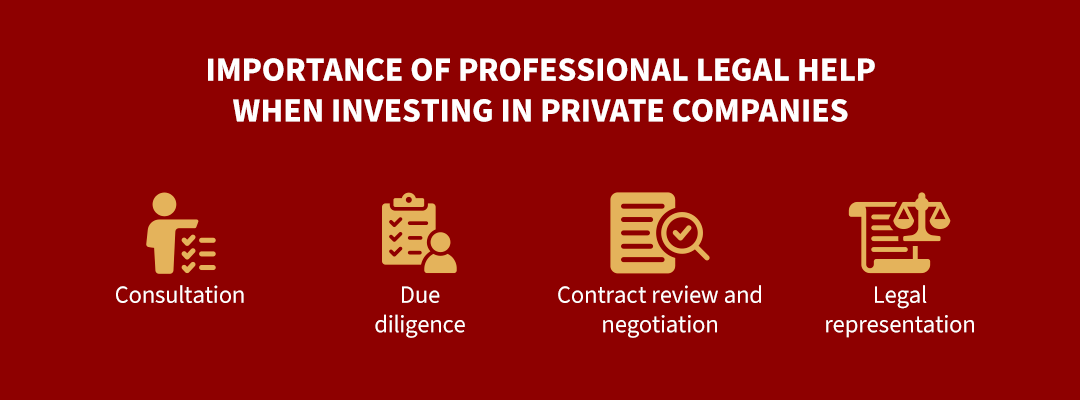Guide to Investing in Private Companies
Private company investments offer investors opportunities to diversify their portfolios and play a vital role in the success of businesses. However, it’s crucial to understand what private company investment entails and how the investments can be structured. In this guide, you’ll learn what private companies are, including the types of private companies available in Massachusetts.
You will also learn why private investment is essential, its challenges, and how to invest in a private company. We cover the methods of private investment and the legal considerations of investing in private businesses.
Calabrese Law Associates provides professional legal services to individuals and businesses engaged in private investment. Our trusted attorneys can help through your legal challenges, regardless of complexity.
What Are Private Companies?
A private company is a business entity owned by an individual, a group of individuals, or a non-governmental entity. Private companies can sell shares or raise capital by other means, although the shares are not traded on a public stock exchange. Private companies are usually smaller in scale and have fewer shareholders than public companies. Ownership is generally restricted to a limited number of individuals, including the promoters or founders, directors, and private investors. In some instances, one person owns all the shares of the business.
Since private companies do not sell their shares to the general public, they are generally not subject to the same financial disclosure and reporting standards as public companies. However, they must comply with state law and best practices to safeguard stakeholders’ interests. Ownership interests in private companies are typically transferred through private negotiations. Business owners can raise capital through various means, such as issuing shares to private investors, loans, or reinvesting profit into the company.
Additionally, private business owners can structure their entity in different ways, including the following:
- Sole proprietorship: This type of business entity is owned and operated by one individual. Sole proprietorships are not separate legal entities, meaning the owner is personally responsible for liabilities, debts, and other related risks. They are often the smallest types of businesses and cannot issue shares.
- Partnership: This type has a similar structure as a sole proprietorship but with two or more owners. Different types of partnerships exist, including general, limited, and limited liability partnerships. Each type has unique legal requirements regarding registration, distribution of debt and liabilities, and asset transfer.
- Limited liability company (LLC): This business type has separate legal personhood, meaning owners are not personally liable for debts and liabilities. LLCs can issue shares, unlike sole proprietorships and partnerships. However, there are guidelines regarding the acquisition and transfer of ownership interests. LLCs can choose to be taxed as any other type of entity.
- S-corporation: This type of corporation elects to pass corporate income, deductions, losses, and credits to shareholders for federal tax purposes. In other words, only the shareholders pay taxes, so there is no double taxation. S-corporations are often best for domestic private business owners because they limit the number of shareholders.
- C-corporation: In this type of corporation, the shareholders are taxed separately from the business entity, making them subject to double taxation. While double taxation can make sense in particular instances, few private businesses incorporate as C-corporations to avoid this. C-corporations also have a more formal structure and allow unlimited shareholders.
Why Invest in Private Companies?
Investing in private companies offers several potential advantages and opportunities for investors, including:
- Growth potential: Private companies usually have significant growth potential due to their agility and flexibility. They can quickly adapt to new market changes, pivot strategies, and leverage emerging opportunities. Decision-making often happens more quickly, allowing the business to respond to customer demands, industry trends, and competitive dynamics.
- Potential for higher returns: Investing in a private company, especially at an early stage, can provide an opportunity to benefit from its growth trajectory and potentially generate substantial returns on investment (ROI) if the company succeeds and increases in value over time. However, private companies also carry risks considering issues like liquidity and market uncertainty. Investors must research the business’s financial history and projections before deciding.
- Diversification: Investing in private companies can help diversify investment in different industries and businesses at various stages of development. This exposes investors to opportunities not readily accessible in the public markets, allowing investors to more finely manage the market exposure and risk tolerance of their portfolios.
- Flexibility in deal structuring: Negotiating favorable terms, including governance rights, equity stakes, and existing strategies, is typically easier to do with investments in private companies than investments in public companies. This flexibility allows investors to tailor their investments to align with their goals and risk tolerance.
- Strategic influence: Private company investments can allow investors to have a direct impact on the company’s strategic direction and decision-making process. Investors can have a seat on the board of directors or other means of influencing operations, depending on the business type and arrangements made.
- Exclusivity and limited competition: Private company investments often have limited participation, creating a sense of exclusivity and potentially reducing competition for investment opportunities.
How to Invest in Private Companies
There are a few steps to follow so you can invest in a private company more confidently. Below are essential things to consider before investing:
1. Strategize
Investing in private companies requires a thorough approach and consideration of various strategies. First, clearly articulate your investment goals and objectives. Are you seeking regular income, long-term capital appreciation, or a combination of both? Are you investing towards retirement or a specific financial milestone? Defining your investment objectives will help you guide your investment decisions.
Second, understand your risk tolerance and capacity to handle potential losses. Different investments carry varying degrees of risk, and aligning your investment strategy with your risk tolerance is essential. While aggressive investors may be willing to tolerate higher risk levels for the potential of earning higher returns, conservative investors may prioritize capital preservation.
Third, consider diversifying your portfolio to mitigate risks. Spread your investment across different asset classes, sectors, and investment types to manage the impact of any single investment’s performance on your overall portfolio.
2. Learn the Investment Types
There are multiple ways to invest in a private company, including the following:
- Angel investment: This method allows investors to fund startups and small businesses at their early stages in exchange for equity ownership. Angel investors bring experience, networks, and financial contributions to support the company’s growth.
- Venture capital: This option is available after the startup phase when a group of savvy investors contribute capital to a growing company in exchange for an equity stake. While angel investors invest their own money, venture capitalist firms typically invest other people’s money.
- Private equity: This type typically involves investing in established private companies to enhance their value over time before selling them through initial public offerings (IPOs) or to other companies. IPOs are one of the methods companies can use to go public, where they make stocks available to retail traders.
- Growth equity: This method focuses on providing capital to companies that have already achieved significant revenue but are undergoing a transformational stage in their life cycle.
- Direct private placement: This option involves investing directly in privately held companies through negotiated transactions. Investors purchase shares directly from the company or existing shareholders.
- Syndicate investment: This type involves pooling funds with other investors to invest in private companies. This strategy allows investors to access larger investment opportunities and distribute risks among the participants.
- Secondary market: This market enables investors to buy and sell existing shares of private companies, providing liquidity to earlier investors and employees who may want to sell their shares before an IPO or acquisition.
Besides raising capital by acquiring ownership interests, companies can obtain funds by taking out loans from investors. Investors are also leveraging new forms of private investments like cryptocurrencies.
3. Find the Right Private Company
Finding the right private company is crucial but challenging for most people. It’s best to use various resources to gather information, including the internet and industry publications. You may also ask for recommendations from professional networks, including colleagues, mentors, and industry experts. Personal referrals can be valuable in identifying firms with a strong track record and positive reputation.
List the businesses you can invest in, and evaluate their performance history, including past investments, returns, and success stories. Then, review the business’ growth strategies to determine whether they are compatible with your investment preferences.
4. Conduct Due Diligence
Caveat emptor or buyer beware is a legal principle that requires buyers to take precautions when buying assets, including ownership interests in businesses. The principle also extends to individuals and companies that invest through lending. Conducting proper due diligence allows you to verify the promoter’s credibility and investment viability. It can also serve as a legal defense in situations of investment fraud. But what is due diligence, and what does it entail?
Investment due diligence means researching an investment opportunity to detect and mitigate associated risks. It covers various scenarios, including private equity and debt finance. There are different types of due diligence, such as the following:
- Legal due diligence: This covers the legal aspects of investments, such as incorporation or registration, ownership, regulatory compliance, litigation, and contractual obligations. The purpose is to confirm the validity of the rights transferred to the investor and the absence of legal risks that could affect the transaction.
- Financial due diligence: This covers the commercial aspects of investments, including market share, business prospects and projections, asset valuation, tax liabilities, and financial risks that could disrupt the business.
5. Assess the Legal Requirements
Although private investments do not generally have the same Securities and Exchange Commission (SEC) reporting and oversight regulations that apply to publicly traded companies, other important legal considerations exist. First, rules govern the acquisition and transfer of ownership interests depending on the kind of business structure. For example, LLC members can assign their interests, although they may require consent from the other members, especially regarding the assignment of management rights.
Second, investment contracts are pivotal in safeguarding your investment interests. Besides stipulating your rights and responsibilities, these agreements cater to ownership interests, governance structure, intellectual property, exit strategies, and dispute resolutions. Carefully review and negotiate the terms for optimal protection.
Third, there are tax implications regarding private investments. Investors must understand the federal and state tax laws, as well as the tax requirements, depending on the type of business structure. These legal considerations are non-exhaustive, so it’s best to consult investment attorneys for professional guidance.
Risks and Challenges of Investing in Private Companies
There are some risks associated with investing in private companies, including the following:
- Less regulation: Like all investments, private company investments attract some levels of volatility. However, investing in private companies is more volatile than investing in public companies because they are generally less regulated. Proper due diligence can help mitigate these risks.
- Less liquidity: Private companies are generally less liquid than public companies. They have restrictions regarding the sale of ownership interests, which sometimes raise liquidity concerns. However, there are other ways to raise capital, including debt financing.
- Valuation challenges: Valuing private companies can be challenging due to the absence of a public market price. Investors may consult financial professionals to make assessments and guide them into making informed decisions.
- Limited information and transparency: Private companies are generally not subject to the same level of public disclosures and reporting requirements as publicly traded companies. Nonetheless, investors may request information during the due diligence process.
Importance of Professional Legal Help When Investing in Private Companies
Investment attorneys play a critical role in private company investments:
- Consultation: Attorneys with experience and knowledge of private investment law can provide consultation services. They can help you understand your rights, responsibilities, and liabilities. Investment attorneys can also assess your situation if you believe you have a legal claim or defense.
- Due diligence: Investment attorneys can conduct thorough legal due diligence on the private company to uncover potential risks, such as contract disputes, litigation, and regulatory breaches. Due diligence helps investors assess the company’s health before making decisions.
- Contract review and negotiation: Attorneys can negotiate, review, and draft investment contracts to capture the parties’ interests. Each investment agreement is unique, so the contract must suit your needs.
- Legal representation: Lawyers can provide legal representation during lawsuits. Besides advocating in courts, attorneys can develop legal strategies and draft and file court processes, including complaints and motions. Attorneys can also help resolve disagreements outside the courtroom.
Contact Calabrese Law Associates for Professional Assistance
Unlike public companies, private businesses raise capital by directly contacting investors instead of trading on public stock exchanges. Investors can acquire ownership interests and sometimes play influential roles in the company’s management. Private companies can also raise capital through private loans.
Regardless of the situation, investors should conduct proper due diligence before transferring money or assets to any promoter. It’s also vital to ensure the stipulations in the contract correctly reflect the interests of the parties.
Calabrese Law Associates provides professional legal support to individuals and businesses regarding their private investments. We serve clients in the Greater Boston Area and throughout Massachusetts. Our private investment attorneys have years of experience in the industry and are ready to help with your needs. Do you have any questions or need legal assistance? Contact us today!
This publication and its contents are not to be construed as legal advice nor a recommendation to you as to how to proceed. Please consult with a local licensed attorney directly before taking any action that could have legal consequences. This publication and its content do not create an attorney-client relationship and are being provided for general informational purposes only.
Attorney Advertising. Prior results do not guarantee a similar outcome.






